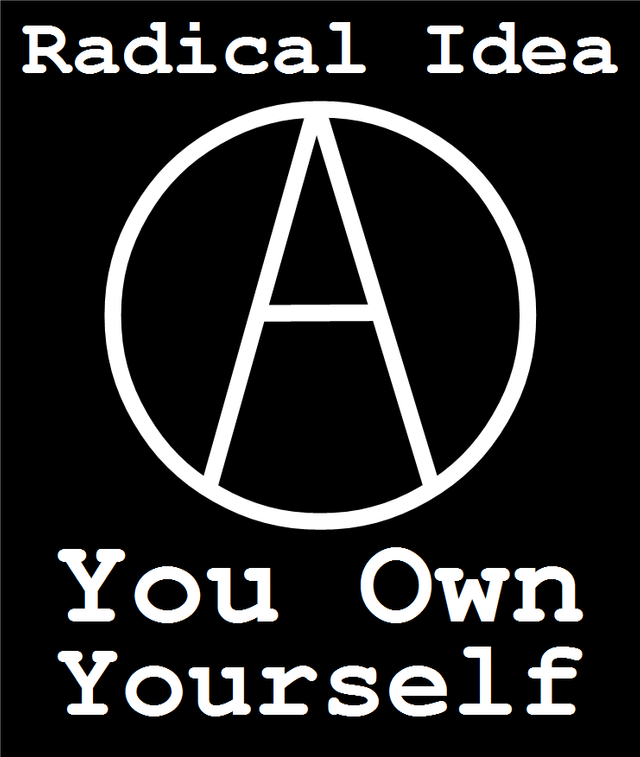Own yourself: you already do.
In many ways, "self-ownership" is a fancy way of saying "free will". It is the acknowledgement that only the actor may make decisive action and thus that both the responsibility for those actions and the natural right to exercise that free will extend from this simple fact.

The vast majority of anarcho-capitalist philosophies -- and indeed, all libertarian/classical liberal and even other "flavors" of anarchist philosophy -- extend from the assumption of self-ownership as an accepted right of the individual. It is treated as a presumed axiom.
Is this necessary? Or can there be a factual and logical foundation to this principle?
This work is an attempt to do precisely that; providing a factual and logical foundation to the principle of self-ownership.
Now, the simplest explanation is to extend from the concept of "free will"; whatever the nature of free will (purely neurological, spiritual or something else), decisive human action is only engaged in by the individual actor. It then is a matter of fact that the actor is always responsible for his actions, and that any ethical system which does not give moral primacy to the actor's claim to ownership of his actions is logically self-defeating as a result. In short, you own your actions as the only actor capable of directing them and therefore own the actor itself (you).
This, while a valid summary for use in a social media comment or quick retort, is neither a sufficient explanation for an in-depth proof nor does it capture the full nuance on what is meant by "self-ownership". As such this work will explore this in greater depth.
The first point to make is to reveal that the voluntaryist position on "self-ownership" is far deeper than a simple "I have a right to won myself". Keeping in mind that a "right" is a morally legitimate power, this is more than a simple axiom; it is based upon the basic nature of a human being.
However, the nuance runs deeper yet; "self-ownership" is both a right and a principle. The actor has the highest-possible rights-claim on himself and, by extension on his actions; as such his actions, in order to be morally legitimate, must respect the highest rights-claims of another's actions. Thus the right of self-ownership naturally implies the principle of non-aggression.
Yet, how may this right of self-ownership be proved?
Since we have already discussed the concept of natural rights, there is no need to digress upon that point: individuals indeed hold morally legitimate power-claims which are ordinally ranked.
Self-ownership, as will now be demonstrated, is the most basic, natural and highest possible such right.
It begins with basic facts of human nature: a human being is a physical being; the human mind is able to form intent; a human mind is able to decide upon courses of action based upon that intent; once an action is decided, a human being is able to engage in that action; finally, no two (or more) different things can exist simultaneously in the same place/time.
This means, just by the nature of the thing, an individual human mind is the only thing which is able to control (concepts such as mind reading/control are beyond the scope of this discussion) its thoughts, desires, values decisions et cetera. As an entirely internal function, the human mind's processes are known only to itself (and that not even fully in most cases day to day); each person can only guess at the motivations of others based upon the actions they take.
In turn, these internal processes result in the additional processes of forming intentions and the decions of how to act based upon those intentions. Again, these internal processes are known and controlled only by the mind itself.
It is only upon engaging in willful action that the mind is known, and that only through observing the action.
Action, in turn, in it's own nature is thus an extension of the mind; it is the mind made manifest into physical change within the world the mind perceives. Action cannot take place without the will, the mind of the actor. Action flows from the actor, not the reverse; the body does not act and then the mind decide to take said action.
Since only the will of the actor can create action, it is then a simple matter of fact that the only actor capable of asserting direct control over the actor itself is the actor itself. This point by now should be clear: regardless of a proposed right of self-ownership, you nevertheless own yourself in practice and in truth. Thus any system of rights which does not assume self-ownership is logically flawed: if self-ownership is not a right, then the rights-claim system eliminates itself in practice since self-ownership is a fact of the self.
Since we know rights to be a logical outcome of human nature, we must therefore conclude that self-ownership is, indeed, a basic human right. However, does this prove the primacy of self-ownership which voluntaryists assert?
After all, it is easy to understand that rights-claims are ranked ordinally, rather than nominally. For a given resource, such as a glass of water for example, any number of people might assert a rights-claim to that resource; however, their claims will have varying degrees of legitimacy based on any number of factors such as who owns the glass, who poured the water et cetera. The individual with the highest moral legitimacy on their claim can be understood as the rightful owner of the glass of water. Cannot ownership of a person as an actor also be ordinally ranked? Of course it can.
Yet the same razor which allows us to conclude that there is only one highest-claim on the glass of water also applies to the person: no two different things can exist simultaneously in the same place. This being the case, only one rights-claim can be exercised at once when there are competing rights-claims. As such, there must be only one highest rights-claim, both on the glass of water and upon the person.
Since, as we have already concluded, only the actor itself may exercise direct control over itself, any system of rights which does not include self-ownership as a right is logically self-defeating. Since no two competing rights-claims may simultaneously hold the position of highest claim, there can in turn be no rights-claim which is capable of infringing upon the right of self-ownership. We can therefore conclude that the highest possible rights-claim in any logically consistent moral framework is that of self-ownership: the rights of others end where your skin begins.
Finally, this in turn presents the responsibility aspect of self-ownership, the principle by which one may determine one's actions to be morally legitimate: do they infringe upon the person of another, violating their consent or bodily integrity? Just as others' rights end where your skin begins, so to do your rights end at the same boundary of another actor.
We can therefore conclude that self-ownership and non-aggression are the highest possible rights-claim and guiding principle of any morally legitimate, logically consistent system of ethics. Absolutely all other rights-claims and guiding principles must extend from this foundation or be rendered illegitimate in practice and in truth.

Thomas Shirk is a computer programmer, Voluntaryist and aspiring philosopher. Please come back to his blog or follow him on Facebook and Steemit for regular updates on Voluntaryism, capitalism and other philosophical insights
Nice post, I couldn't have said it better myself ;) It's great to see so many anarchists on Steemit. Take an upvote and a follow good sir, I doff my cap to you.